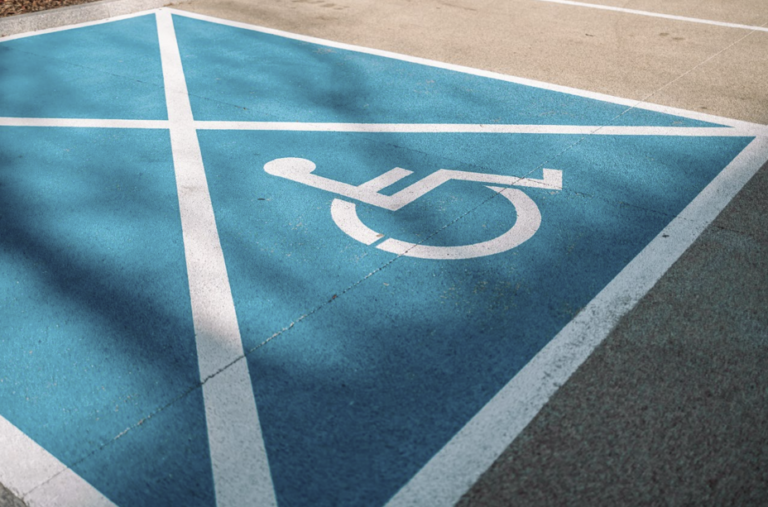If your business has a parking lot, ADA compliance is not just a good idea; it is required by law. Ensuring your lot is accessible to everyone, including individuals with disabilities, helps you avoid fines and demonstrates a commitment to equal access. Let’s walk through what ADA compliance entails and how to ensure your parking lot meets the requirements.
Why ADA Compliance Matters
ADA stands for the Americans with Disabilities Act, which was enacted to prohibit discrimination against individuals with disabilities. This includes physical access to public spaces, like parking lots, that serve employees, customers, and visitors. Compliance is not optional. Every parking facility that serves the public, whether it is a retail store, church, school, office building, or apartment complex, must meet ADA standards.
The ADA guidelines are in place to ensure that individuals with mobility challenges, visual impairments, or other physical limitations can safely park and navigate to your building. Failing to comply does not just create a legal risk. It sends a message that accessibility is not a priority. That can affect your brand and your bottom line.
What does ADA mean in a parking lot?
When it comes to parking lots, ADA compliance refers to a set of federal regulations that determine how many accessible parking spaces you must provide, how those spaces are marked and measured, and how they connect to accessible routes.
For example, every accessible parking space must be level, clearly marked with a visible sign, and situated near the building entrance. There must also be an adjacent access aisle. This aisle provides enough space for people to enter and exit a vehicle using a wheelchair or other mobility aid. Access aisles are marked with diagonal striping to prevent other cars from parking in them.
Curb ramps are another significant component. If the path from the parking area to the building includes a curb or elevation change, a properly designed ramp must be installed to ensure accessibility. The surface of all walkways and ramps should be stable and slip-resistant. These requirements provide a safe and usable path from the parking lot to the door.
ADA regulations also require that accessible spaces connect to an entrance that is itself ADA compliant. That includes automatic or push-to-open doors, wide entryways, and routes that do not require stairs.
What qualifies for ADA parking?
An ADA parking space must meet specific size and signage requirements. A standard accessible space must be at least eight feet wide with a five-foot-wide access aisle. For van-accessible parking, the space must be at least eleven feet wide, or the access aisle must be widened to eight feet. These measurements provide enough room for ramps or lifts to be used safely.
Each accessible space must have a vertical sign mounted high enough to be seen over a parked vehicle. The sign should display the International Symbol of Accessibility and indicate if the space is van accessible. Painted symbols on the asphalt are helpful, but they do not replace the need for upright signs.
To qualify as ADA-compliant, the surface must also be smooth and stable. Large cracks, loose gravel, or steep slopes can disqualify a space, even if the dimensions and signs are correct.
It’s not just about the individual space, either. Your lot must have the correct number of accessible spaces based on total capacity. For instance, a lot with 25 parking spaces must have at least one accessible space. That number increases as the total number of spaces rises. For every six accessible spaces, at least one must be van-accessible.
At Walt’s Paving, we understand every detail of ADA regulations and how to apply them to real-world parking lots. Whether you’re building a new facility or updating an existing one, we can help you create a layout that meets all standards while remaining functional and visually appealing.
How to Ensure Compliance from the Start
The best time to think about ADA compliance is before construction begins. Designing with accessibility in mind helps you avoid costly changes down the road. It also gives you more flexibility in terms of layout and aesthetics.
However, if your lot already exists, you are not off the hook. Older lots must be brought into compliance if it is readily achievable. That means if the changes are practical and can be made without significant difficulty or expense, you are legally obligated to make them.
A professional site evaluation is the best place to start. That includes checking slope, surface condition, signage, striping, and path of travel. If upgrades are needed, they should be completed as soon as possible. The longer you wait, the more you expose your business to risk.
Keep in mind that ADA standards are federal law, but many states and municipalities have additional requirements. Your project should always follow the strictest guidelines that apply to it. Partnering with a contractor who knows the ins and outs of both national and local codes is key.
The Cost of Noncompliance
Failing to meet ADA standards can result in more than just a fine. Lawsuits, penalties, and accessibility complaints are not just possible; they are common. Businesses have been fined thousands of dollars for improper signage or failing to maintain access aisles.
Even if no legal action is taken, your reputation is at risk. Customers notice when businesses go out of their way to provide an accessible and welcoming environment. On the other hand, they also notice when they feel overlooked or excluded.
Compliance is about more than checking boxes. It is about demonstrating that your business values the needs of all people and is committed to taking the necessary steps to serve them.
Build It Right with Walt’s Paving
Making your parking lot ADA-compliant is not just a legal requirement. It is a wise, responsible business decision. From proper grading and striping to signage and layout, every detail matters.
At Walt’s Paving, we help Indiana businesses meet accessibility standards without sacrificing quality or curb appeal. If you need help bringing your parking lot into compliance or want to make sure your next project is done right from day one, give us a call.
How can Walt’s Paving help?
You can count on Walt’s Paving to complete your residential or commercial paving project in an efficient and timely manner. We have over 40 years of experience paving asphalt driveways, making asphalt repairs, and sealcoating asphalt. We are located in Osceola, IN, and serve homeowners and businesses within a 50-mile radius of Elkhart, IN. Call us today!







